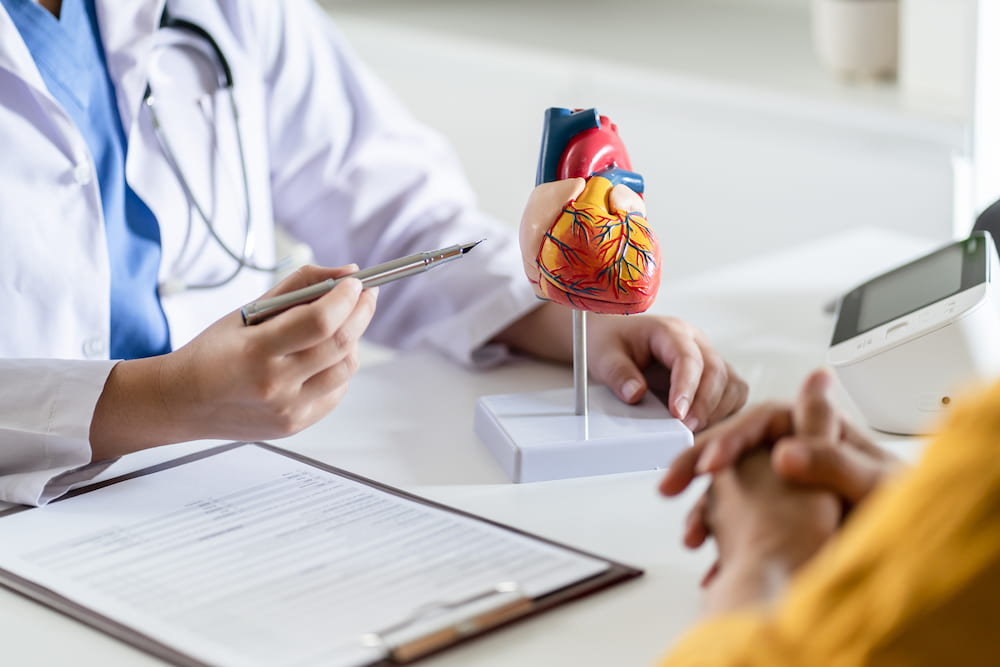Heart disease remains one of the leading causes of death worldwide; but early intervention can significantly improve outcomes. A good way to start caring for your heart is by forming healthy habits and building a lifestyle that supports this goal.
Besides learning how to manage your heart health as you age, knowing the warning signs that indicate a need for immediate heart care and cardiology services is also lifesaving. Read on as this article discusses critical signs to watch out for, signalling it’s time to seek medical help as soon as possible.
Chest Pain or Discomfort
Chest pain is one of the most recognizable signs that you need heart care and cardiology services. This can manifest as a persistent ache, a sharp stab, or a crushing or burning sensation. Chest pain that occurs during physical activity or emotional stress and subsides with rest can be particularly concerning, as it may indicate coronary artery disease.
Should you experience any chest pains or discomfort, don’t hesitate to consult a heart care Chicago specialist for expert advice and treatment if you’re in the area.
Shortness of Breath
Experiencing breathlessness during routine activities that you used to perform without difficulty could be a red flag. This symptom could be an indication of heart failure, where the heart can’t pump blood effectively, or other cardiac issues that require immediate evaluation by a cardiology service.
Palpitations
Feeling like your heart is racing or fluttering irregularly, known as palpitations, can signify arrhythmia. If not addressed promptly by a cardiology specialist, arrhythmias can lead to more severe cardiac conditions.
Excessive Fatigue
Unusual and prolonged fatigue, especially if accompanied by other symptoms like dizziness or shortness of breath, can be a warning sign of heart disease. If simple activities like climbing stairs or walking short distances tire you out, it’s wise to consult a heart care and cardiology services provider.
Swelling in Legs and Feet
Edema, or swelling in your legs and feet, can indicate that your heart is not pumping blood effectively. It could be a symptom of heart failure, making it crucial to seek heart care and cardiology services to prevent further complications.
Dizziness or Syncope
Frequent dizzy spells or fainting episodes (syncope) can suggest arrhythmia or other heart conditions that affect the blood flow to your brain. Seek immediate assessment from a cardiologist to determine the cause and appropriate treatment.
Unexplained Wheezing or Cough
Persistent coughing or wheezing that occurs without an apparent cause, like a respiratory infection, might be a sign of heart failure. Fluid buildup in the lungs can make breathing difficult, and it’s a common symptom that needs urgent heart care and cardiology evaluation.
Pain in Arms or Shoulders
Heart issues can cause referred pain, which might be felt in areas other than the chest, such as the arms, shoulders, back, or jaw. Pain in these areas, mainly if it appears suddenly and during physical exertion, warrants a visit to a cardiology service provider.
Cold Sweat and Nausea
Breaking out in a cold sweat or feeling nauseous are lesser-known yet critical signs of a heart attack. If you experience these symptoms and any discomfort in your chest or upper body, seek heart care and cardiology services immediately.
Irregular heartbeats during or after physical activity could also indicate a serious underlying heart condition. Feel free to contact a cardiology service for a thorough examination.

Tips for Better Heart Health
Now that you’ve learned about the warning signs of cardiovascular problems, it’s the perfect time to learn how to cultivate a lifestyle that minimizes your risk of experiencing such conditions. Here are several practical tips:
Maintain a Healthy Diet
A heart-healthy diet is rich in vegetables, fruits, whole grains, and lean proteins such as fish and poultry. It limits the intake of saturated fats, cholesterol, and trans fats. It also includes sources of omega-3 fatty acids, like salmon and flaxseeds, which are beneficial for the heart.
Exercise Regularly
Regular physical activity can help you maintain a healthy weight, lower blood pressure, and strengthen the heart. Aim for about 150 minutes of moderate-intensity exercise, like brisk walking or cycling, or 75 minutes of vigorous activity, such as running each week.
Monitor Your Blood Pressure
High blood pressure is a significant risk factor for heart disease. Monitor your blood pressure regularly and follow any prescribed treatments or lifestyle changes if it’s high.
Manage Cholesterol Levels
High levels of bad cholesterol (LDL) can lead to the buildup of plaques in your arteries, increasing your risk of heart disease. If necessary, check your cholesterol regularly and manage it with diet, exercise, and medication.
Limit Alcohol Intake and Avoid Smoking
Excessive drinking of alcohol can raise your blood pressure, and smoking is a major risk factor for heart disease. Limiting alcohol intake and avoiding tobacco in all forms can significantly benefit your wellness.
Control Diabetes
If you have diabetes, tight control of your blood sugar levels can help reduce the risk of heart disease. Follow your treatment plan and regularly consult your healthcare provider.
Manage Stress
Chronic stress may contribute to heart disease. Meditation, deep breathing exercises, and yoga can help manage stress.
Get Adequate Sleep
Sleep is essential for your overall well-being. It’s worth noting that the lack of sleep has been linked to a higher risk of heart disease and increased blood pressure. So, aim for seven to nine hours of quality sleep per night.
By integrating these practices into your lifestyle, you can significantly improve your heart’s health and reduce your risk of heart disease.
Wrapping Up
Your heart health is your top priority, and recognizing these signs can empower you to take action. With early detection and treatment through heart care and cardiology services, you can reduce the risk of serious complications. Cardiologists can work with you to understand your symptoms and create a personalized plan to keep your heart healthy.
Did you find this helpful? Check out our other helpful articles on our website.
Read Also
- Modern Approaches to Adolescent Mental Health Treatment for Lasting RecoveryWith increasing numbers of teens experiencing emotional and behavioral health concerns, adolescent mental health treatment has become more essential than ever. Conditions such as anxiety, depression, trauma and mood instability are on the rise, and effective support must evolve with these growing needs. Today’s treatment models blend evidence-based therapy with flexible access and holistic care, giving… Read more: Modern Approaches to Adolescent Mental Health Treatment for Lasting Recovery
- How to Find a 5-Star Dentist Near YouChoosing a dentist is more than just finding someone who can clean your teeth. It’s about selecting a trusted partner in your long-term oral health. A 5-star dentist not only provides excellent clinical care but also delivers a positive patient experience, from the moment you walk in until the moment you leave. Whether you’re new… Read more: How to Find a 5-Star Dentist Near You
- Your Easy-Peasy Guide to Brewing Amazing MatchaHey there! So, you’ve heard all the buzz about matcha – that vibrant green powder that’s not just pretty but packed with good stuff? It can seem a little fancy and intimidating at first, but trust me, making a delicious cup at home is simpler than you think. Forget complicated ceremonies for now; let’s just… Read more: Your Easy-Peasy Guide to Brewing Amazing Matcha
- Embracing Holistic Wellness: Insights from a Lansing, MI Health CenterReframing Health: Moving Beyond Symptom Management Treating only symptoms often offers quick relief, yet long-term results stay out of reach. When care zeroes in on isolated complaints, the bigger picture, such as stress, behavior, or lifestyle, often gets missed. Research shows that whole-person care, which looks at physical, emotional, and environmental factors, yields better outcomes… Read more: Embracing Holistic Wellness: Insights from a Lansing, MI Health Center
- VO₂ Max Testing Explained: What It Is & Why It Matters for Your HealthVO₂ max sounds like a term reserved for elite athletes, but it’s among the most accurate measures of your lifetime and general condition. Moreover, it goes beyond performance. Monitoring your VO₂ max will help you to ascertain your body’s capacity to control stress, its oxygen consumption efficiency, and your internal ageing process. If you have… Read more: VO₂ Max Testing Explained: What It Is & Why It Matters for Your Health
- So, what exactly is matcha?Think of matcha as green tea turned up to eleven! Instead of steeping leaves and tossing them out, matcha is made by grinding whole green tea leaves into this super-fine, vibrant green powder. You whisk it right into hot water (or milk!), meaning you’re drinking the entire leaf. That’s why folks say you get way… Read more: So, what exactly is matcha?
- How to Tell When It’s Time for Professional Senior Care SupportCaring for an aging loved one is a journey filled with love, patience, and difficult decisions. One of the toughest choices families face is knowing when it’s time to seek extra help. In this article, trusted Los Angeles caregivers for seniors explore the signs that it might be time to bring in professional support, not… Read more: How to Tell When It’s Time for Professional Senior Care Support
- Reporting a Work Injury: What Deadlines You Need to KnowAfter a workplace injury, time isn’t always on your side. Many employees aren’t aware that there are strict deadlines for reporting a work-related injury, and missing that window can put your entire claim at risk. Whether your injury was sudden or developed gradually over time, it’s essential to act quickly and follow the proper steps.… Read more: Reporting a Work Injury: What Deadlines You Need to Know









